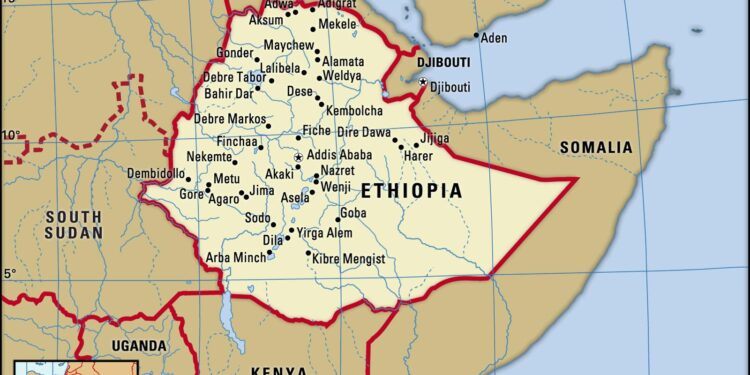Unveiling Ethiopia’s Gold Market: Informal Trade Dominance and Its Economic Consequences
The Growing Influence of Informal Gold Trading in Ethiopia
Recent analyses reveal that a vast majority of Ethiopia’s gold production bypasses official channels, flowing predominantly through informal markets. This widespread practice not only evades government regulation but also significantly undermines potential tax revenues, posing serious questions about the long-term economic viability and governance of the sector. As Ethiopia endeavors to expand its mining industry and attract international investors, these findings highlight the intricate challenges involved in harnessing gold resources effectively for national development.
The surge in informal gold trading reflects broader shifts within the country’s economic landscape. Local miners often prefer quick sales outside formal systems due to fluctuating global prices and cumbersome bureaucratic procedures. Consequently, this trend complicates efforts to regulate extraction activities sustainably while ensuring equitable benefits for communities involved.
Key Drivers Behind Informal Gold Markets
Several critical factors contribute to the expansion of unregulated gold trade across Ethiopia:
- Accessible Entry Points: Minimal capital requirements make artisanal mining an attractive livelihood option for rural populations.
- Volatile Global Prices: Rapid changes in international gold values incentivize miners to sell quickly through informal networks rather than wait for formal market processes.
- Lax Enforcement: Weak regulatory oversight allows unofficial transactions to flourish unchecked.
- Cultural Traditions: Established local customs favor barter systems and direct exchanges, embedding informality into everyday commerce.
| Aspect | Formal Market | Informal Market |
|---|---|---|
| Regulatory Oversight | Tightly controlled by authorities | Largely absent or ineffective |
| Tax Compliance | Diligently enforced taxes apply | Avoidance is common practice |
| Easiness of Access for Miners | Bureaucratic hurdles limit participation | Easily accessible with minimal barriers |
| Sustainability Measures & Environmental Controls < td >Mandatory environmental safeguards enforced< / td >< td >Often neglected or ignored< / td > |
Navigating Regulatory Obstacles Within Ethiopia’s Gold Sector Informality Challenges & Solutions for Effective Oversight
The predominance of unregulated gold trade presents formidable obstacles for Ethiopian authorities aiming to monitor production volumes accurately and enforce legal frameworks. A significant barrier is the scarcity of reliable data on artisanal mining outputs since much activity occurs covertly outside official purview. This opacity not only deprives public coffers but also impedes efforts toward sustainable resource management.
A further complication arises from limited awareness among small-scale miners regarding formal market benefits or compliance requirements—perpetuating cycles where informality remains entrenched.
Tackling these issues demands targeted interventions such as:
- Cultivating educational campaigns that emphasize advantages linked with registration and legal trade participation;
- Simplifying licensing procedures tailored specifically toward small-scale operators;
- Cultivating educational campaigns that emphasize advantages linked with registration and legal trade participation;
- Simplifying licensing procedures tailored specifically toward small-scale operators;
- Providing accessible training programs alongside financial support mechanisms designed explicitly for grassroots miners.
- u2022Simplify Regulatory Frameworks: Streamline policies reducing red tape hindering legitimate mining ventures;
- u2022User-Centric Training Programs: Equip artisanal miners with knowledge on sustainable methods plus compliance protocols;< / li >
- u2022Create Public-Private Partnerships (PPPs): Leverage collaborations between government agencies & private enterprises fostering infrastructure development including digital traceability tools.< / li >
An emphasis on transparency can be achieved by deploying centralized digital platforms tracking all stages from extraction through sale — enabling real-time monitoring accessible publicly — thereby curbing illicit activities.
< th > Key Indicator< / th >< th > Current Level< / th >< th > Target Goal< / th > < td > Percentage Of Formally Traded Gold< / td >< td > Approximately 15% (2024 estimate)< / td >< td > Aim For At Least 70% By 2030 < td > Registered Artisanal Miners< td 30,000 (current) The Road Ahead For Sustainable Growth In Ethiopian Gold Mining
The dominance of informal markets within Ethiopia’s gold economy poses significant challenges impacting fiscal revenues as well as environmental stewardship efforts. Addressing these concerns necessitates coordinated action involving policymakers committed to reforming regulatory frameworks alongside empowering local stakeholders through education & capacity building.
Only through such inclusive strategies can Ethiopia unlock its full potential as a responsible producer contributing meaningfully both domestically & globally — ensuring wealth generated supports broad-based socio-economic progress.
The future prosperity tied closely with this precious metal depends heavily upon successfully integrating currently marginalized actors into transparent value chains without compromising ecological integrity or social equity.
- u2022Create Public-Private Partnerships (PPPs): Leverage collaborations between government agencies & private enterprises fostering infrastructure development including digital traceability tools.< / li >
An integrated approach involving collaboration between governmental bodies, local communities, and international organizations can foster transparency throughout supply chains while promoting adherence to global standards governing mineral extraction practices.
Paving The Way Forward: Formalization Strategies And Transparency Enhancements For Ethiopian Gold Mining
A comprehensive strategy aimed at transforming Ethiopia’s largely informal gold sector into a regulated industry requires multifaceted initiatives:














